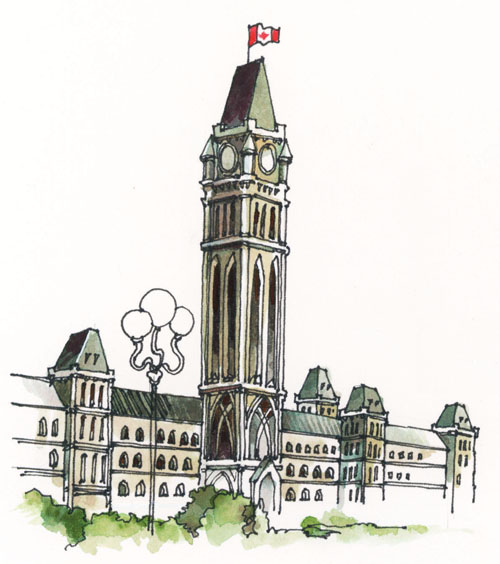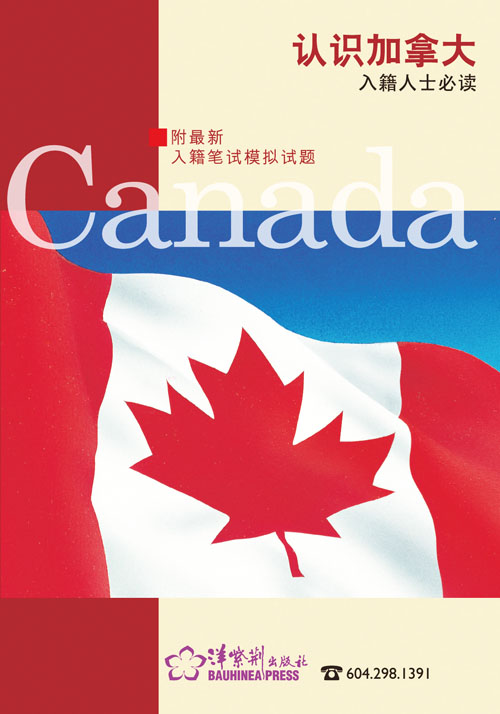
Parliament Buildings, Ottawa
There are three key facts about Canada's system of government : our country is a federal state, a parliamentary democracy and a constitutional monarchy.
FEDERAL STATE
There are federal, provincial, territorial and municipal governments in Canada. The responsibilities of the federal and provincial governments were defined in 1867 in the British North America Act, now known as the Constitution Act, 1867.
In our federal state, the federal government takes responsibility for matters of national and international concern. These include defence, foreign policy, interprovincial trade and communications, currency, navigation, criminal law and citizenship. The provinces are responsible for municipal government, education, health, natural resources, property and civil rights, and highways. The federal government and the provinces share jurisdiction over agriculture and immigration. Federalism allows different provinces to adopt policies tailored to their own populations, and gives provinces the flexibility to experiment with new ideas and policies.
Every province has its own elected Legislative Assembly, like the House of Commons in Ottawa. The three northern territories, which have small populations, do not have the status of provinces, but their governments and assemblies carry out many of the same functions.
Source: Discover Canada, page 28
加拿大人如何治理其國家
加國政治制度有三個重點:聯邦制、民主國會和君主立憲制。
聯邦國家
加國有不同級別的政府:聯邦政府、省政府、區域政府、市政府。聯邦及省政府的職責在1867年《英屬北美法案》(現稱《1867年憲法法案》)中已明確界定。
聯邦政府負責國家及國際事務,包括國防、外交政策、跨省的貿易和通訊、貨幣、航運、刑事法和國籍法。省政府負責各市的政府、教育、醫療、天然資源、財產和民事權利,以及公路等。農業及移民事務的管轄權則由聯邦和省政府共同負責。聯邦制容許不同省份因應其人口而訂立各種新提議及政策,並靈活施行。
各省份都有自行選出的省議會,像渥太華的眾議院一樣。三個北部地區人口稀少,地位不像各省,但他們的政府及議會也有相類似的功能。
To listen on your Android phone, scan with the free app Google Goggles and tap on the MP3 for “How Canadians Govern Themselves”.
To listen on your iPad or computer, follow these steps:
• google (search 搜尋) the words “listen to discover canada”
• click (or tap) on the link “Listen to Discover Canada”
• click on “Download each section”
• click on “How Canadians Govern Themselves”
• click on “Listen to this chapter”
• click on “MP3”
注釋
key = important 重要
state = nation 國家
democracy = a form of government in which the people choose their leaders by voting 民主政府
monarchy = a form of government in which the country is ruled by a king or queen (a monarch). In a constitutional monarchy (君主立憲制), the monarch's power is defined and limited by the constitution.
federal government 聯邦政府
provincial government 省政府
territorial government 區域政府
municipal government 市政府
responsibility = a duty you are required or expected to do 責任
define = show or explain clearly
constitution = a system of beliefs and laws that govern a country 憲法
international = involving two or more countries. International matters 國際事務
defence = what a country does to protect itself from enemies 國防
interprovincial trade = trade between provinces 省與省之間的貿易
currency = 貨幣
criminal law = laws dealing with crime and punishment 刑事法
natural resources = 天然資源
property = something that you own 財產;資產
civil rights = the rights that you have as a person民權
jurisdiction = the right to govern 管轄範圍
adopt = accept officially 通過;採納
tailor = (verb) make something so that it meets some special needs or purpose(作動詞用)度身訂造
flexibility from the word flexible = willing to try or change to suit new conditions 靈活的;可變通的
experiment with = try
assembly = a group of people who have been elected to make laws and change laws. Legislative Assembly 立法議會
House of Commons = part of Canada's Parliament whose members are elected by voters 國會眾議院
population = 人口
carry out = do or complete something 執行;付諸行動
function = 功能

中文翻譯節錄自《認識加拿大:入籍人士必讀》一書,星島日報辦事處有售。






